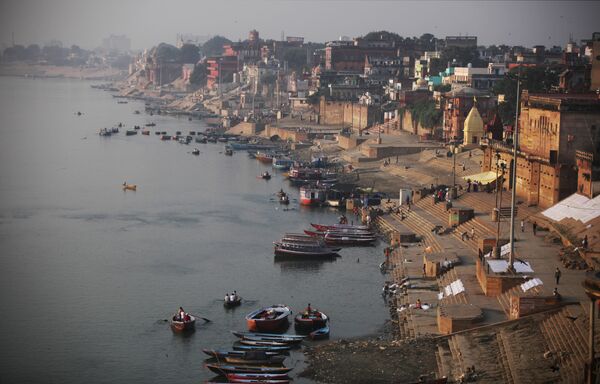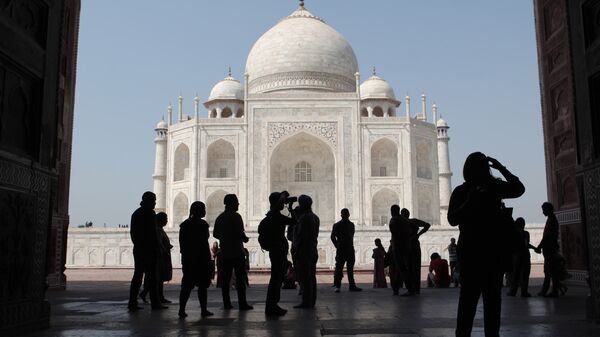As mass unemployment has been undermining the burgeoning economic growth of India for years, Indian Prime Minister Narendra Modi was touting tourism as a potential sector to boost employment and thereby curb the criticism of "jobless growth".
However, months after Modi set a target for every Indian to visit at least 15 tourist destinations within the country by 2022, COVID-19 has crippled the industry that generated $28.6 billion in revenue in 2018 and created 42.7 million jobs, making up 8.1 percent of total employment in the country.
Taking an initial estimate of the losses to the tourism sector of India, a wave of unemployment is expected to hit 50 million people directly and indirectly employed in the sector, as per data from the apex tourism body the Federation of Associations in Indian Tourism and Hospitality (FAITH).

The honchos in the industry agreed that travel and tourism are expected to bounce back by the middle of 2021, but until then colossal damage will be done to its all diverse portfolio - cruises, adventure, medical, wellness, sports, meetings, incentives, conferencing, exhibitions (MICE), eco-tourism, film, rural, and religious tourism.
“India’s tourism and aviation sector was the first industry to be hit. Many believe, this crisis is a greater threat than earlier ones such as 9/11 and the financial meltdown of 2008-09 and India’s tourism and aviation sector faces questions on its very survival”, Subhash Goyal, the chairman of FAITH, told Sputnik.
The tourism association projects that the industry is staring at an economic loss of up to $67 billion in the absence of any bailout package from the government. Goyal added that the travel and tourism industry has been totally neglected and lies at the mercy of the pandemic, while in other countries the sector was given relief packages within days of the lockdowns being imposed.
“In India, more than one-and-a-half month has passed and so far nothing has been done to save millions of jobs and save economic activity in India”, he added.
Earlier, on 23 March, Prahlad Singh Patel, India's minister of tourism, said that the government has not conducted a specific study on the impact of the spread of the coronavirus on tourism, but data from January and February suggested that foreign tourist arrivals remained unaffected by the pandemic. In the first two months of the year, around 2.2 million foreign tourists arrived in India, which was equivalent to data for January-February 2019. The wave of COVID-19 only hit the country in March.
Revival Road Map
With the crippled and stagnant business for over six months or more, the road to recovery will be slow by way of the re-defined “new normal”, with its utmost shift of focus to health security, hygiene, and minimum social contact. The recovery will be majorly dependent on the psychological factor of travellers as they will be more pensive than ever.
With the current scenario, rebuilding the trust, confidence, and, at the same time, motivating the wanderlust amongst travellers appears to be a new challenge for the industry.
- Going Digital
The most crucial thing that the hospitality industries have to incorporate will be the use of technology, says Sandeep Singh, the managing director of the luxury hotel chain Goldstone Hotels.
After the coronavirus pandemic is over, travellers will be conscious of their hygiene and health more than ever. Therefore, rebuilding the trust and re-inspiring travellers' confidence and wanderlust through marketing and advertising will be foremost.
“Artificial Intelligence, ordering through tablets and digital check-ins and check-outs will play a catalytic role in reviving the hospitality industry. Seamless digitisation would be the new normal in the hotel industry. We will have to work on half occupancy and with half of the staff members to ensure minimum human contact”, explained Singh.
- Investing in COVID-19-Proof Equipment
Singh estimates that a little investment in ensuring hygiene and sanitation at hotels, airports, and sightseeing places will go a long way in terms of a speedy and effective recovery for the industry. Disinfection tunnels, no-touch robotic sanitisers, and luggage disinfectant will be some of the equipment that will not only help in maintaining health and hygiene standards, but also in building up the trust of travellers.
“Screening of the people and taking appropriate measures from the point when a guest is picked up from the airport, to the moment he checks out, will help in rebuilding the trust of the customer”, he said.
He added that it is important to note that leniency in the post-COVID-19 world would have a disastrous impact on the business, because even a single case of the coronavirus could lead to a suspension and other legal issues that would tarnish the image.
Responsibility and accountability have now increased manifold, he emphasised.
Pay More For COVID-19 Proof Standards
Travellers will now have to loosen their purses much more than ever to get updated health and hygiene facilities.
“The prices are expected to increase by 10-20 percent as we would now be functioning on 50 percent occupancy and with better hygiene standards. And we think the guest would be more willing to pay for a better facility, the right sanitation and health standards”, said Singh.
Survival of the Fittest
The hardest hit by the pandemic are the small, independent tour operators who used to run their business through small offices spread across nooks and corners of the country. More than 50 percent of the companies are estimated to go bankrupt.
“With embassies, flights and visa facilities shut, domestic tourism is the only way to survive through digitalisation and updating of the product with required information in the post COVID scenarios. A centralised website, catering to the need for both national and international customers, will not only help the small business owners survive the blow, but also provide ease to travellers”, said Rustagi.
Silver Lining for the Industry Amid Chaos
The tourism industry was the first to shut down with the spread of the virus and will be the last to open once the situation improves. However, it still has a sunny side to look up to - the crisis is expected to lure conglomerates to the domestic market, which earlier preferred overseas business.
The hospitality and aviation industries are expecting that the multi-billion entertainment industry, Bollywood, is looking forward to explore scenic and remote locations within the country. Producers with humongous budgets used to travel to foreign locations such as Switzerland to shoot movies, but the pandemic has scarred sentiments for the long-run, as filmmakers and actors will now be wary of crossing borders.




